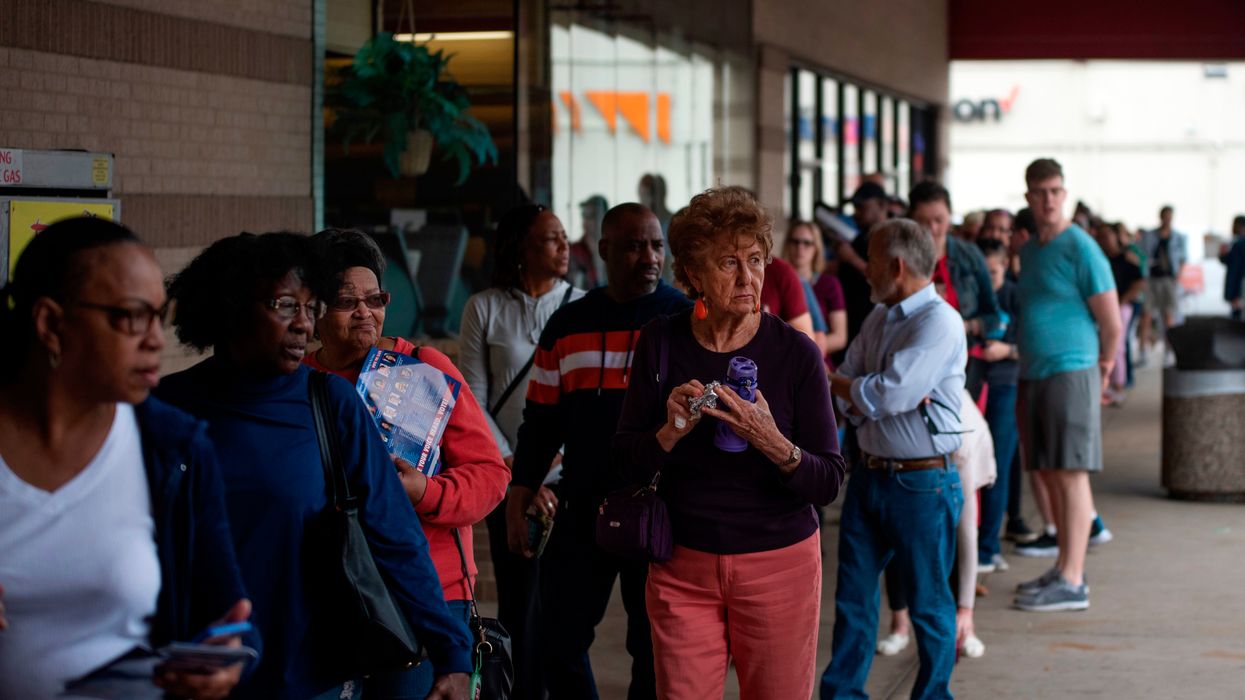A federal judge says that for this election, at least, Texas must preserve straight-ticket voting, which is how two-thirds of the state's ballots are usually cast.
The decision, if it survives a promised appeal by Republicans in charge in Austin, would likely assist Democrats within reach of their best showing in the state in decades this fall. But it would distress many democracy reform advocates, who lament how civic engagement is limited and two-party dominance is preserved when voters are allowed a single choice supporting all of one party's candidates.
As voting policies continue to shift, thanks to decisions in statehouses and courthouses across the country, the ruling was one of three developments in purple states Friday. Iowa joined the roster of states that will start processing absentee voting envelopes sooner than usual, and Montana joined the list of states extending the usual deadline for the arrival of mailed ballots.
These are details of the most recent developments.
Texas
The ruling came less than three weeks before the start of early in-person voting in the second-most-populous state, which for more than a century has given Texans the opportunity to cast a single-party line vote — which 5.1 million did just two years ago. The Republican-majority Legislature eliminated that option starting this fall.
But Judge Mariana Garcia Marmolejo of Laredo temporarily blocked implementation of the law on the grounds that, during the coronavirus pandemic, it would "cause irreparable injury" to voters "by creating mass lines at the polls and increasing the amount of time voters are exposed to Covid-19." She also said the switch would discriminate against Black and Latino voters because their waits would be especially long, in part because many live in urban and rural precincts with the fewest polling places per person.
Garcia Marmolejo's decision effectively reverses her ruling in June dismissing an earlier version of the lawsuit, in which the Democrats pressed essentially the same arguments the judge embraced this time. She said some procedural differences, but mainly the persistence of the health emergency, are what prompted her change of mind.
GOP Attorney General Ken Paxton announced Saturday he would press the federal appeals courts to act quickly to reverse the judge, because otherwise officials will have to scramble to reprogram voting machines and reprint ballots.
Texas historically has one of the nation's longest ballots, especially in presidential years, when many state and county legislative, administrative and judicial posts are also contested. Democrats argue the straight-ticket option allows many voters to do what they'd do anyway, if they had to mark dozens of ovals, and has the vital benefit of keeping people moving quickly through polling places.
Republican pushed the law ending the practice with arguments echoing many good-government experts, who say it will give underdogs and outsiders stronger chances and compel voters to become better-informed about all the contests and candidates.
Texas is one of seven seven states that have done away with straight-ticket balloting in the past decade, leaving just five sure to make the option available this fall: Battleground Michigan and solidly Republican Alabama, Indiana, Kentucky, Oklahoma and South Carolina
President Trump carried Texas by 9 percentage points in 2016, extending a GOP winning streak that started in 1980, but two polls released last week had him ahead of Joe Biden by 3 and 5 percentage points — essentially within the margin of error. Democrats also are within reach at taking several congressional seats from the GOP and maybe reclaiming the state House for the first time in 18 years.
Iowa
The bipartisan state Legislative Council approved a request from Republican Secretary of State Paul to allow election clerks to open outer absentee ballot envelopes and verify signatures starting two days earlier than in the past — on the Saturday before Election Day. And now the counting of the ballots can begin a day ahead of, instead of on, Election Day.
Like so many other election officials expecting a record number of mailed-in votes, Iowa is worried that delayed starts to processing and counting will lead to delayed results in close races — and make voters anxious about the election's integrity.
Nearly 600,000 Iowans have requested absentee ballots so far, compared to fewer than 150,000 at this time in 2016. Trump appears to have a narrow but hardly impenetrable lead in the race for the state's six electoral votes, while GOP Sen. Joni Ernst's reelection quest and Democrats' bids to hold three of the four House seats are all too close to call.
The Legislative Council, a group of lawmakers empowered to make some policy switches in place of the Legislature, also decided to allow the mailing of ballots to voters in health care facilities — normally, the law requires hand delivery — and to allow the secretary of state to shift polling place locations in an emergency.
Montana
State trial Judge Donald Harris decided that absentee ballots postmarked by the time the polls close must still be counted if they arrive six days late — by Nov. 9.
The pandemic "presents an untenable problem for voters who wish to have all the available information prior to casting their ballot, who wish to reduce potential Covid-19 exposure, and who also wish to have their vote counted," he wrote. "Moving the Election Day receipt deadline to a postmark deadline would alleviate the pressures voters are facing in the November 2020 general election and result in less disenfranchised voters."
Unless there's an appeal, which did not immediately seem likely, Montana will be the ninth state to extend the deadlines this year — reducing the number of disenfranchisements but extending the timetable for knowing the results of close races. The other deadlines have ranged from three to 17 days.
Trump is confident of securing the state's three electoral votes again. The marquee election is the tossup Senate contest between GOP incumbent Steve Daines and Democratic Gov. Steve Bullock.




















